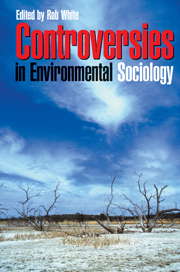Book contents
- Frontmatter
- Contents
- Tables and Figures
- Author Notes
- Abbreviations
- Introduction: Sociology, Society and the Environment
- PART I SOCIAL PERSPECTIVES
- PART II SOCIAL TRENDS
- 6 When the Population Clock Stops Ticking
- 7 Inequality, Social Differences and Environmental Resources
- 8 Sustainable Technology: Beyond Fix and Fixation
- 9 Think Global, Act Local
- 10 Citizenship and Sustainability
- 11 The Environment Movement
- PART III SOCIAL ISSUES
- Index
- References
9 - Think Global, Act Local
Scalar Challenges to Sustainable Development of Marine Environments
Published online by Cambridge University Press: 05 June 2012
- Frontmatter
- Contents
- Tables and Figures
- Author Notes
- Abbreviations
- Introduction: Sociology, Society and the Environment
- PART I SOCIAL PERSPECTIVES
- PART II SOCIAL TRENDS
- 6 When the Population Clock Stops Ticking
- 7 Inequality, Social Differences and Environmental Resources
- 8 Sustainable Technology: Beyond Fix and Fixation
- 9 Think Global, Act Local
- 10 Citizenship and Sustainability
- 11 The Environment Movement
- PART III SOCIAL ISSUES
- Index
- References
Summary
Among the social sciences, long-standing debates continue about the effects of economic globalisation. Part of that discussion is about the principles and practices by which to be modern and exhibit stewardship over economic, social and environmental well-being. Often ‘sustainability’ describes the principles of such care, and ‘sustainable development’ denotes the practices by which these are enacted.
Debating the worth and consequences of economic globalisation involves asking to what extent the state is best placed to address the challenges of modern life. This question informs concerns about democracy and citizenship. Supra-statists advocate investing more power in structures and processes of global governance and government, suggesting more centralising and authoritarian strategies for ‘the greater good’. Sub-statists are equally committed to devolving power to sub-national systems of decision-making that privilege the local (Wapner 1995). Advocates of both positions attribute to existing state systems the vast majority of environmental woes, calling for the reorganisation of political life and the transference of power up or down spatial scales.
Differences between supra-statists and sub-statists bring into sharp relief questions about the scale at which sustainable development is best deployed. The catch-cry think global, act local captures this uncertainty, suggesting that economic, social and environmental problems are trans-boundary, and the need to engage and empower via democratic and civic rights and responsibilities for sustainable development. Nowhere are such issues better etched than in relation to archetypal trans-boundary domains, the global commons, including the marine environment.
- Type
- Chapter
- Information
- Controversies in Environmental Sociology , pp. 150 - 167Publisher: Cambridge University PressPrint publication year: 2004



